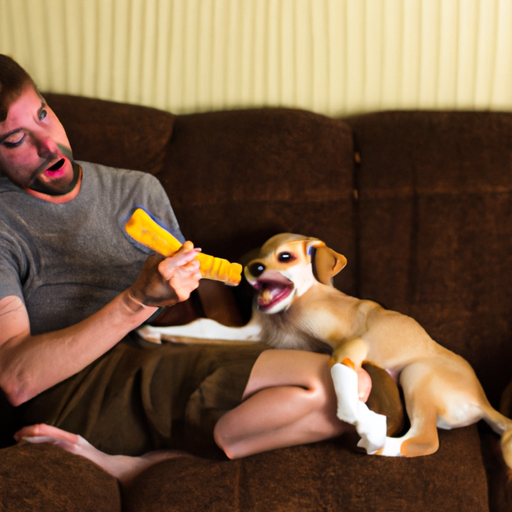It’s a scenario all too familiar for many dog owners – you come home to find your favorite shoes or furniture chewed up by your beloved pet. In this guide, we will discuss some effective strategies to prevent your dog from chewing on inappropriate items.
Understanding Why Dogs Chew
First and foremost, it’s important to understand why dogs chew. This behavior is completely natural and can be attributed to a variety of reasons:
- Teething: This is especially common in puppies who are going through the teething process.
- Boredom: Dogs often chew to keep themselves occupied when they’re bored.
- Anxiety: Chewing can be a stress-relieving activity for anxious dogs.
Understanding the root cause of your dog’s chewing behavior is the first step in curbing it.
Providing Appropriate Chew Toys
One effective way to redirect your dog’s chewing habit is by providing them with appropriate chew toys.
- Durable Chew Toys: These are designed to withstand your dog’s powerful jaws and provide long-lasting entertainment.
- Interactive Toys: These toys provide mental stimulation to keep your dog occupied.
- Edible Chew Toys: These are treats that can be chewed, providing both a delicious snack and a rewarding chewing experience.
| Type of Toy | Examples |
|---|---|
| Durable Chew Toys | Kong, Nylabone |
| Interactive Toys | Puzzle toys, treat-dispensing toys |
| Edible Chew Toys | Bully sticks, dental chews |
Training Your Dog Not to Chew
Training your dog not to chew on inappropriate items is a key part of resolving this issue. Here are a few strategies:
- Positive Reinforcement: Reward your dog when they chew on their toys and ignore other objects.
- Distraction: If you catch your dog chewing on something they shouldn’t, distract them with their own toy.
- “Leave It” Command: Train your dog to understand and respond to the “leave it” command.
Addressing Underlying Issues
If your dog’s chewing habit is caused by anxiety or boredom, addressing these underlying issues can help reduce their need to chew.
- Boredom: Provide your dog with plenty of physical exercise and mental stimulation.
- Anxiety: Consult a vet or a dog behaviorist to identify triggers and develop a treatment plan for your dog’s anxiety.
Regular Check-Ups and Dental Care
Regular vet check-ups and proper dental care can also contribute to reducing your dog’s chewing habits. Dental diseases can cause discomfort, leading your dog to chew more.
- Regular Vet Check-Ups: These can help identify any potential health issues that may be causing excessive chewing.
- Dental Care: Brushing your dog’s teeth and providing dental chews can help maintain their oral health.
FAQ
Q: My dog is still chewing on things despite providing chew toys. What do I do?
A: This could be a sign of anxiety or boredom. Consult with a vet or a dog behaviorist for further advice.
Q: Are there any specific chew toys you recommend?
A: Kong toys, Nylabone, and interactive puzzle toys are all great options. Always choose a size appropriate for your dog.
Q: How can I train my dog to stop chewing my shoes?
A: Use positive reinforcement to reward your dog for chewing on their toys and ignoring your shoes. Training them to understand the “leave it” command can also be helpful.
Q: How often should I replace my dog’s chew toys?
A: This depends on how aggressively your dog chews. Monitor the condition of the toys and replace them when they start to wear out or break apart.
Remember, every dog is unique and what works for one may not work for another. It’s important to be patient and persistent in finding a solution that works for your furry friend.



